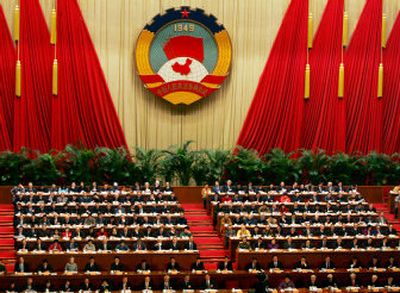China’s budget for its military likely to jump

BEIJING – China’s military spending, a point of contention with the United States, will jump 17.8 percent this year, the spokesman for the National People’s Congress said today.
Jiang Enzhu told a news conference on the eve of the annual meeting of China’s legislature that military spending would hit $44.94 billion in 2007 – an increase of $6.84 billion over last year, though experts believe the true figure of China’s military spending could be several times the amount that it reports.
Jiang said most of the money would be spent on boosting wages and living allowances for the 2.5 million-member People’s Liberation Army, and on upgrading armaments. He did not give any other details.
The announcement of the increased budget comes as China’s leaders display renewed confidence in their ability to control divisive political debate, putting to a vote a toughly contested bill on property rights at this year’s session of the national legislature.
The proposed property rights law and an uncontroversial corporate tax bill are the only pieces of legislation before the congress in its 12-day session, which opens Monday. The two measures are all but certain to pass, legal scholars and Chinese political watchers said.
Such certainty says much about change in a political system in which the Communist Party tightly controls the reins of power but ordinary Chinese, emboldened by economic and social changes, feel increasingly free to voice opinions.
Dominated by the party, the congress is largely powerless. Still, a year ago an angry campaign by conservative communists that portrayed the property bill as a sellout of popular interests to a corrupt business elite – and that was amplified by fiery Internet postings – forced leaders to scuttle plans to put the measure before the congress.
Now, “the central leadership is quite comfortable with the debate because they can control it,” said Cheng Li, a Chinese politics specialist at Washington’s Brookings Institute. At the congress session, “they want to create a kind of atmosphere. They want to show there’s some openness.”
In power for nearly five years, ever-cautious party chief Hu Jintao, Premier Wen Jiabao and other leaders are coming into their own, putting their stamp on policies to spread the benefits of economic growth more evenly across a society with a large rich-poor gap.
The initiatives, though still works in progress, have proven popular.
Heavy politicking is always the main agenda at the congress, which is comprised of nearly 3,000 members drawn mainly from provincial political notables and military commanders.
Congress deputies are to pass the government’s budget, including the hefty increase in military spending, and endorse policies to keep the economy humming along at a slightly moderated pace from its double-digit growth of the past four years.
China’s increased military spending has drawn comments from the United States, most recently from Vice President Dick Cheney, who on a swing through Asia last month said some of Beijing’s actions were at odds with its words about its military expansion being peaceful.